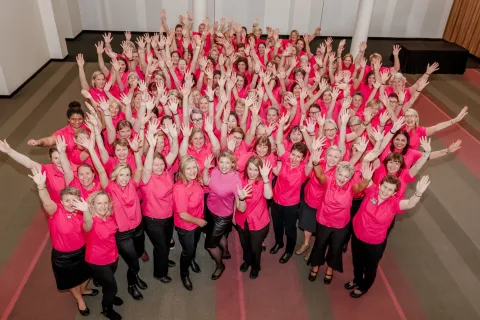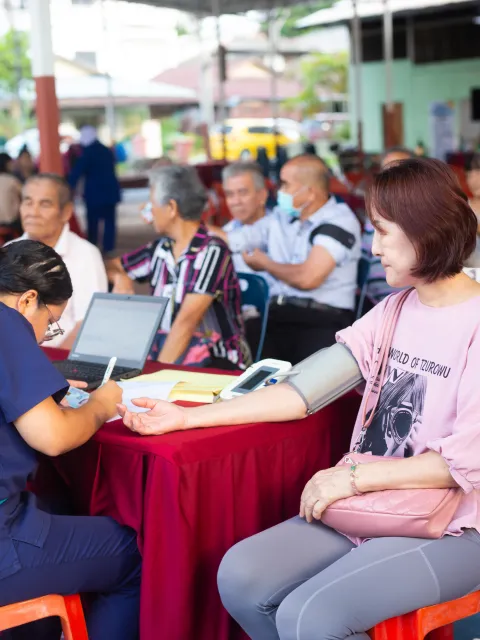UICC launches interactive map to show the achievements of SPARC
On International Women’s Day, UICC has launched an interactive map to showcase the important work being done as part of the SPARC Metastatic Breast Cancer Challenge programme.

Five years ago, UICC and Pfizer Oncology joined forces to create a new and powerful opportunity to improve the lives of people with metastatic breast cancer (MBC).
Since then, the Seeding Progress and Resources for the Cancer Community: MBC Challenge (SPARC MBC Challenge), has grown in leaps and bounds. This world-spanning grant initiative has so far directly benefitted over 14,000 patients through support groups, psychosocial interventions, patient navigation programmes and more. It has catalysed changes both big and small, from improving the quality of life of individual patients to influencing government policy.
To celebrate this programme’s impact and to mark International Women’s Day, UICC has launched a brand-new interactive map: an in-depth look at the many ways the SPARC MBC Challenge has paved the way to a better future for MBC patients worldwide.
“It is exciting to share this new map with the cancer community, showcasing and sharing the efforts of organisations to improve the lives of and care for metastatic breast cancer patients around the world. The map represents a fantastic opportunity for organisations to learn from others and not reinvent the wheel, to engage in new collaborations, and further their impact.“
– Kirstie Graham, Director, Capacity Building, UICC
Why was SPARC created?
MBC is the most advanced stage of breast cancer. It occurs when the disease spreads to other parts of the body and, since there is no cure, a diagnosis can be devastating. However, in many cases, treatment can help to prolong survival and improve the quality of a patient’s life. Increased awareness may also help reduce the number of women diagnosed with breast cancer at a late stage, and thus improve outcomes.
It was with this in mind that UICC and Pfizer Oncology launched the SPARC MBC Challenge in 2015. The programmes’ goals: to close the gap in patient information and support, build better awareness for earlier detection of breast cancer, influence national policies and strengthen health systems.
A light in the darkness
Since those beginnings, the SPARC MBC Challenge’s real-world effects can be found everywhere. With more than 50 projects launched, from Canada to Kenya to Tajikistan and beyond, the programme’s impact is being felt around the globe:
- Awareness campaigns and informational resources made possible through SPARC grants have so far reached over 140,000 people worldwide.
- The programme has featured over 500 institutional collaborations, including hospitals, governmental agencies, partners and NGOs.
- SPARC has to date facilitated the training of over 2,300 individuals in areas like palliative care, advocacy and patient navigation.
- New legislation is providing improved access to care for people living with MBC.
- Patients are now better prepared and supported to navigate complex and challenging health care systems and referral pathways, easing at least some of the burden of this disease.
Innovation in collaboration
Numbers alone don’t tell the whole story. One of the SPARC MBC Challenge‘s strengths is how it facilitates innovative collaboration, allowing leading minds and dedicated cancer professionals from around the world to build upon each other’s work.
One example is the University of Cyprus (UCY) project ‘GIFTED’. In 2019, a UCY team was awarded a SPARC grant for a project that proposed to develop an avatar-based web platform for guiding women with MBC through treatment and managing their symptoms. Notably, the project’s first phase was built upon work by an earlier SPARC project: a study of the psychosocial needs of women living with MBC conducted by Europa Donna Cyprus. The findings of that study provided a strong foundation upon which the UCY team could build, ultimately resulting in a more effective platform.
Bridging the equity gap
On 8 March, the world unites for International Women’s Day. It’s a chance to both reflect upon the state of women’s rights around the world and to look ahead at the fight for equity with renewed focus and energy.
The equity gap in health is real. In low- and middle-income countries, many more breast cancer cases are diagnosed at an advanced stage than in high-income countries. This creates an immense and unfair burden, which is why equitable access to healthcare is at the core of both UICC’s mandate and the SPARC MBC Challenge’s mission – and why this is the perfect day to launch the map.
Mapping SPARC’s success
The ecosystem of the SPARC MBC Challenge projects is rich and complex, and the impact of grantees’ work profound, that it can be difficult to truly appreciate its full scope. To date, the SPARC MBC Challenge has enabled the creation of over 3,600 resources – everything from apps and podcasts to training kits and awareness materials – in 30 languages.
The map is designed to share this wealth of information in an accessible way; it’s both a celebration of the SPARC MBC Challenge’s successes and a valuable trove of information. We hope that these resources will serve as a basis to future projects addressing the needs of MBC patients across the world and inspire new ideas on how to best serve these patients. The deeper a user explores, the more resources they can uncover, from scientific articles, training manuals, videos, apps and more. Today’s launch allows users to see it all in a dynamic new light.
Get started now. Search for your area of interest and begin your journey.
Screenshot of the SPARC Map in action on the SPARC MBC page (click on image to access the map)
Last update
Monday 09 March 2020
